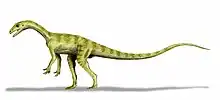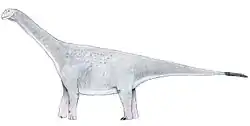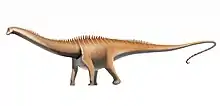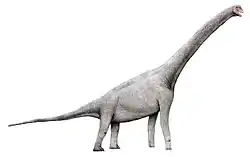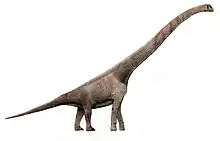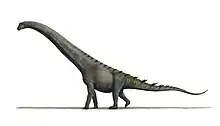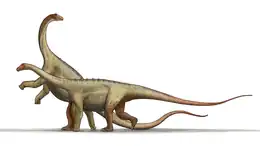| Dinodocus Temporal range: Early Cretaceous, | |
|---|---|
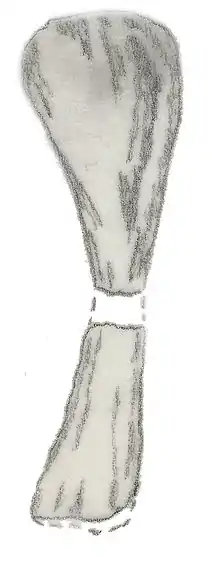 | |
| Humerus of the holotype | |
| Scientific classification | |
| Domain: | Eukaryota |
| Kingdom: | Animalia |
| Phylum: | Chordata |
| Clade: | Dinosauria |
| Clade: | Saurischia |
| Clade: | †Sauropodomorpha |
| Clade: | †Sauropoda |
| Genus: | †Dinodocus Owen, 1884 |
| Species: | †D. mackesoni |
| Binomial name | |
| †Dinodocus mackesoni Owen, 1884 | |
| Synonyms | |
| |
Dinodocus (meaning "terrible beam") is a genus of sauropod dinosaur, named by Richard Owen in 1884. The name is now usually considered a nomen dubium. The only species, D. mackesoni, a name given to some fossil bones from the Lower Greensand Group (Lower Cretaceous) of Hythe, Kent, England, were formerly placed in the genus Pelorosaurus (Mantell, 1850[1]), but a review by Upchurch et al. (2004) concluded that Dinodocus is a nomen dubium.[2]
Discovery and naming
The holotype was discovered in 1840 by Mr H. B. Mackeson. In 1841, Richard Owen noted on the fossils.[3] The holotype, NHMUK 14695, was listed by Owen as "portions of the corocoid, humerus and ulna, iliac, ischial and pubic bones, a large portion of the shaft of a femur, parts of a tibia and fibula, and several metatarsal bones". Owen assigned the specimen to the pliosaur Polyptychodon.[3] In 1850, Gideon Mantell assigned the specimen to Pelorosaurus[1] but Richard Owen placed the fossils in a separate genus, Dinodocus, in 1884. In 1908, Dinodocus was synonymized with Pelorosaurus again, this time by Arthur Smith Woodward.[4] In 2004, Paul Upchurch validated the genus Dinodocus.[2]
References
- 1 2 "Fossilworks: Pelorosaurus". fossilworks.org.
- 1 2 Upchurch, P., Barrett, P.M. and Dodson, P. 2004. Sauropoda. In The Dinosauria, 2nd edition. D. Weishampel, P. Dodson, and H. Osmólska (eds.). University of California Press, Berkeley. Pp. 259–322.
- 1 2 Owen R (1841) "Report on British Fossil Reptiles. Part II". Page 195. Report of the British Association for the Advancement of Science, 11th Meeting (1841).
- ↑ Woodward A S (May 1908) "Note on Dinodocus mackesoni, a cetiosaurian from the Lower Greensand of Kent". Geological Magazine 5(5): 204-206.
